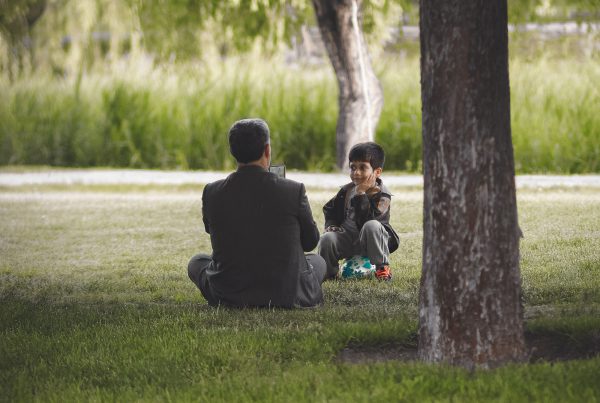What do you do if you feel like no one cares or understands what your grief feels like? It may feel like the world kept spinning and everyone got on with their lives, but you are still in the same, painful place. Others don’t recognize the hurt you are going through, and they brush your pain away as if you can turn it off with the switch of a button. If you are feeling completely alone in your grief, you may be experiencing disenfranchised grief.
As one of the seven universal emotions, grief is a complicated experience that every person will go through at some point in their lives. Especially with the onset of the COVID-19 pandemic in recent years, many of us have had to confront the realities of death and human fragility more regularly than we’d like. With loss comes the unfortunate experiences of pain, turmoil, and difficulty as one learns to navigate life with the loss of a loved one. Of course, grieving is not limited to deaths of those closest to us, but can be felt during intense periods of change or loss during a person’s life — like dealing with a breakup, receiving life-threatening diagnoses, or losing financial security. Many individuals can relate to the psychological, emotional, and life-changing toll that grief takes on the body, but there is a type of grief, disenfranchised grief, that many people go through alone, and it is hardly ever discussed. In this blog, we will go through the details of what disenfranchised grief is, what we can do to support those in our lives who are experiencing it, and how this emotion impacts our mental health.
What are the different types of grief?
Anticipatory Grief & Grief from Sudden Loss
Grief is defined as the sorrow that one experiences after going through a considerable loss. The things that individuals grieve over may vary, but it is typically triggered by very intense events like the death of a close family member or friend, the onset of a terminal illness of a loved one, going through a tough relationship breakup, or losing your career. Grief can result in a torrent of unpleasant, hopeless emotions that result in depression, anger, rumination, guilt, and sadness. Some common reactions to grief include:
- Anger at oneself, the deceased, and others
- Feelings of numbness and depression
- Lacking motivation for everyday tasks
- Struggling to concentrate
- Becoming increasingly irritable
- Feeling hopeless and unsure of what to do next
- Feeling “crazy”
- Ruminating on what you could have done differently
- Wanting to “escape”
- Questioning faith or belief in higher powers
- Contemplating the meaning of your own life
- Physical symptoms like nausea, decreased appetite, insomnia
The duration and type of grief that people experience completely varies from person to person, and even circumstance to circumstance. For example, if an individual with a terminally ill parent knows that their parent is going to pass away within a certain amount of time, that person may experience anticipatory grief for what will eventually happen. This type of grief allows people to prepare for the oncoming pain as they picture what their lives will look like in the future, say their goodbyes, do activities together that will bring closure, and mentally prepare for the adjustments they will make once that person is gone. On the other hand, there is another type of grief that can be experienced from unexpected loss, change, or death. Examples of these events range from things like losing your home in a natural disaster, experiencing the sudden loss of a friend or family member, or major accidents. When a sudden loss occurs, people tend to feel extremely overwhelmed and traumatized because they were unable to take any steps toward preparing themselves for a major life shift. There is no time to process what is going on with sudden loss, and this can cause people to grieve for longer amounts of time and feel even more severe sadness and hopelessness compared to those who may be going through anticipatory grief.
Disenfranchised Grief
What we are focusing on in today’s blog is disenfranchised grief, also known as silent or hidden grief. This is a type of grief that society does not allow or accept because it is seen as “unnecessary” or not normal. For example, when an acquaintance like a coworker or teacher dies, people may feel as though they aren’t allowed to or entitled to grieve because they are not considered to be ‘close’ friends or family members of the deceased. In 1989, Dr. Kenneth Doka formally defined disenfranchised grief as a process by which a loss was not openly acknowledged, validated, or allowed in a social setting. Essentially, individuals feel like their ‘right to mourn’ is taken from them because society does not think it appropriate for them to grieve.
Examples of disenfranchised grief include:
- Miscarriages
- Loss of a pet
- Losing a boyfriend/girlfriend
- Divorce
- Infertility
- Losing a job
- Losing a loved one at an extremely young or old age
- Losing a loved one to suicide or addiction
- Losing an extramarital affair
- Losing someone who is incarcerated
- Diagnosis of life-threatening illness
- Losing a body part or limb
- Grief that lasts “too long”
Grief is already such a complicated and deeply painful experience, but to have that pain become stigmatized or unacknowledged by society can make it even more difficult. For example, if a woman loses her baby in the first trimester of pregnancy, she might be made to feel like she is not allowed a lot of time to grieve, and may even be encouraged to ‘get over’ that child because she can have another one and her pregnancy was not far along anyway. Or, individuals who have lost loved ones to suicide, addiction, or even those who have lost people who were incarcerated may feel like they cannot grieve their loved ones because the circumstances under which they died may be viewed as social taboos. When death carries stigma, people may avoid reaching out and looking for support because they are embarrassed over the conditions in which their loved ones passed. Moreover, someone who is going through anticipatory grief or grief from sudden loss may experience disenfranchised grief if they find themselves to be grieving for too long or too intensely that society begins to question why they haven’t just ‘gotten over’ it yet. Others may stop having patience for their grief, or dismiss it all together because the ‘acceptable’ time to grieve is over. The circumstances that affect how disenfranchised grief manifests can vary between cultures, and what may be considered a normal amount of time to grieve in one place might be completely different in another. It can also be influenced by gender, age, and what community one belongs to.
Healing from Disenfranchised Grief
When individuals suffer from disenfranchised grief, the process to healing is very lonely and can feel even more insurmountable than recovering from any other type of grief. It feels like others do not acknowledge that their loss exists, or that the person suffering should even be allowed to feel that way. On top of the pain that loss and major change has caused, people dealing with disenfranchised grief have to also carry feelings of embarrassment, shame, and extreme loneliness. Individuals who struggle with disenfranchised grief are at a higher risk of depression, withdrawal from society, turning to substance abuse, and have difficulty forming new relationships, so it is important to recognize when someone is withdrawing in their grieving process and show support. There are ways to help those experiencing disenfranchised grief, and they include:
- Recognizing that everyone grieves for different things. Those experiencing disenfranchised grief feel like what they are going through does not matter to anyone else. They may feel ashamed that what they are feeling is not socially acceptable, so it can be very helpful to express to this person that their feelings are valid and that their relationship with the pet, the person, or the place that they are grieving is real. Help emphasize that what they lost was an important piece of their life, and the grief that they are going through is necessary to move on. Even if what they are grieving over is something that another person would not, that does not make their experience any less real or significant.
- Being reachable. When a person feels that their grief is too unique to be openly acknowledged, they may never want to reach out to those around them for support. Even if grief and sadness are awkward and hard situations to talk about with others, try to reach out to your friend or family member that is grieving and let them know that you are there for them and want to help them through their pain. Do not ignore or minimize what they are going through just because it can get uncomfortable. Let them know that you recognize their grief and are a person that they can lean on!
Joining a support group. If you are a person going through disenfranchised grief, it is important to recognize that you are truly not alone. What you are going through is something that many others have also experienced and you do not need to be embarrassed for how you feel. If there is no one in your life that you can talk to, there are plenty of resources and grief support groups that you can join without shame. Talking through your feelings may help you let go of some of your pain, and you may even find your grief being validated and reaffirmed by others who are going through the same thing.






